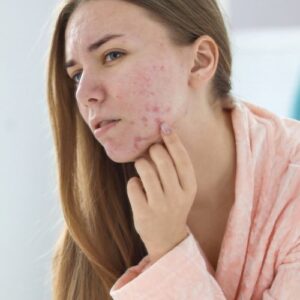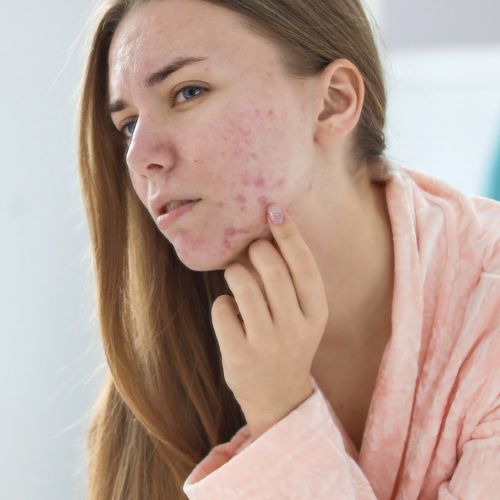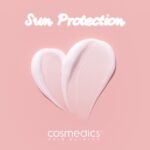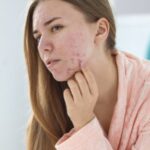Get In Touch
Please call us or fill in the form below and we will be delighted to help with your enquiry.
 0207 386 0464
0207 386 0464
The Sunday Mail’s ‘Live Well’ explored one of the most unwelcome symptoms of acne or spots, which is the whitish/yellowish pus that develops in the middle of spots.
The feature contacted Dr Ross Perry, GP and founder of Cosmedics Skin Clinics, to understand more about the problem. As a leading UK expert on skin conditions, Dr Perry is often featured in the media. He told the Sunday Mail:
“The yellow pus in a spot is the result of your body’s natural immune response to infection or inflammation. For example, when bacteria, commonly involved in acne, invades a clogged pore, the immune system sends white blood cells to the area to fight off the infection. As these white blood cells attack the bacteria, the immune cells and bacteria die, creating a thick fluid known as pus.”
Understanding Acne
 The skin doctors and dermatologists at Cosmedics Skin Clinics see a number of adult patients who are struggling with acne.
The skin doctors and dermatologists at Cosmedics Skin Clinics see a number of adult patients who are struggling with acne.
Acne is a common skin condition that primarily affects adolescents and young adults, though it can persist into adulthood for many individuals. The development of acne is often linked to a combination of factors, including hormonal changes, excess oil production, clogged pores, and the presence of bacteria. Hormonal fluctuations, particularly during puberty, menstruation, or pregnancy, can lead to an increase in oil production by the sebaceous glands, resulting in clogged follicles. When these pores become blocked, they create an environment where bacteria can thrive, leading to inflammation and, ultimately, the formation of pimples.
The appearance of yellow pus in an acne spot is indicative of the body’s response to this bacterial invasion. This inflammatory process is a critical aspect of acne severity, as the accumulation of pus can lead to more noticeable blemishes and an escalation of the condition.
Acne Treatment Options
Treatment options for acne vary depending on its severity and underlying causes. For mild cases, over-the-counter topical treatments containing ingredients such as benzoyl peroxide or salicylic acid can be effective. These ingredients help to reduce oil production, promote the turnover of skin cells, and eliminate acne-causing bacteria.
For more moderate to severe acne, prescription medications, including topical retinoids or oral antibiotics, may be recommended by healthcare professionals to address inflammation and inhibit bacterial growth. In some cases, hormonal treatments—such as birth control pills for women—may be employed to balance hormones that contribute to acne flare-ups.
In addition to medical treatments, lifestyle changes can also be helpful in managing acne. Maintaining a consistent skincare routine, avoiding heavy makeup, and eating a balanced diet rich in antioxidants may contribute to healthier skin. Furthermore, incorporating practices to reduce stress, such as regular exercise or mindfulness techniques, can help mitigate flare-ups related to hormonal changes. By addressing both the physiological and environmental factors contributing to acne, individuals can work towards achieving clearer skin.
Acne Skin Treatments
There are now a number of effective clinical skin treatments that can help to improve the health and condition of the skin, reducing the severity of acne as well as the risk of scarring. Options include:
- TIXEL thermal fractional treatment
- Chemical peels
- Light based treatments such as laser and/or IPL
Cosmedics Skin Clinics based in London offers dermatology services with dermatologist Dr Maria Chakarova as well as offering a number of highly experience doctors and plastic surgeons.
Cosmedics Skin Clinics
Cosmedics Skin Clinics was established in 2003 and has built up an excellent reputation for cosmetic and medical treatments, carried out by GMC Registered Doctors. The company offer a full range of cosmetic treatments, including popular lip enhancement and anti-wrinkle injections/fillers; plus medical treatments including mole removal, thread vein treatment and excessive sweating injections.
Cosmedics Skin Clinics has a team of skin treatment doctors and surgeons in their 5 skin clinics across London and Bristol led by Dr Ross Perry.
Call 020 7386 0464 or email enquiries@cosmedics.co.uk to book an appointment.




